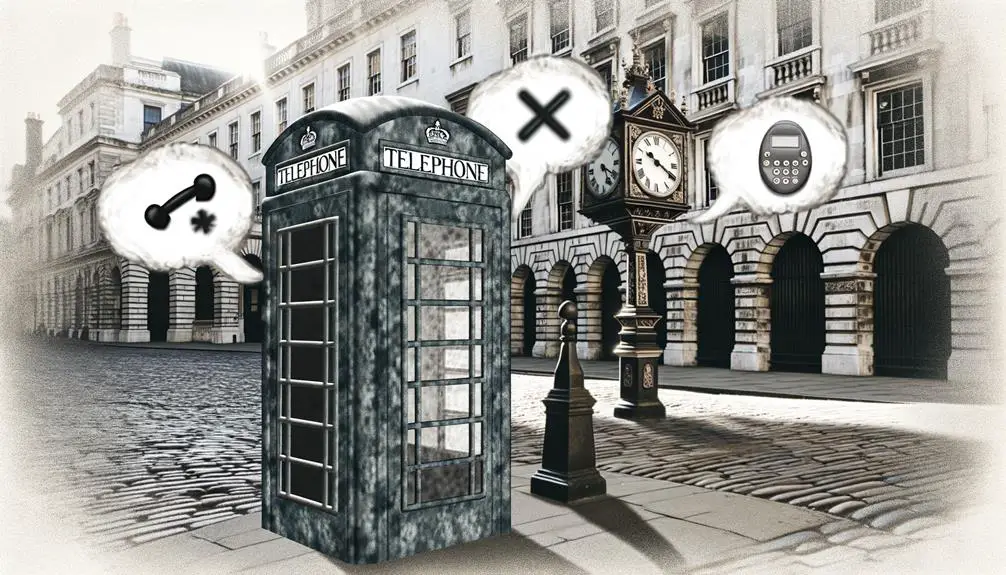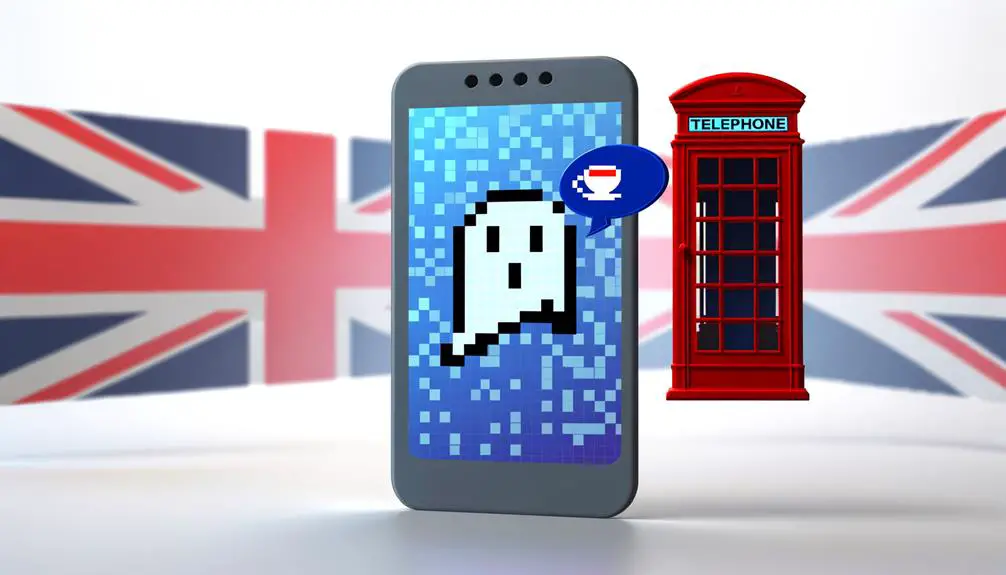In British slang, when you're "aired," it means someone's ignoring you or pretending you don't exist. It's a reflection of the nuanced dynamics in British social interactions, emerging from the streets of London into widespread use. This term mirrors the indirect ways people communicate disinterest or disapproval, carrying weight in both digital and physical spaces. In the age of instant messages, being aired can feel like a sharp digital snub, amplifying feelings of isolation. Unlike ghosting, which is a total cut-off, airing leaves a sliver of hope for future communication. Grasping this concept opens the door to understanding deeper social undercurrents.
Origins of "Aired"

Delving into the origins of 'aired' in British slang, it's essential to recognize that its roots are deeply embedded in urban culture, evolving from the vernacular of London's streets. This term's journey from marginal to mainstream highlights the dynamic nature of slang evolution, reflecting the linguistic roots of a vibrant, ever-changing city. You'll find that 'aired' isn't just a word; it's a linguistic snapshot of societal shifts and attitudes.
Understanding this evolution requires acknowledging the role of urban environments in shaping language. London, with its rich tapestry of cultures and communities, serves as a crucible for linguistic innovation. Here, words are more than mere communication; they're expressions of identity, resistance, and belonging. 'Aired,' like many slang terms, likely originated in these communal spaces, spreading through conversation, music, and social media.
The linguistic roots of 'aired' also reveal the influence of multicultural interactions. London's diverse population has contributed to a slang lexicon that borrows from various languages and dialects, enriching English with new expressions and meanings. Through this lens, 'aired' is more than a word; it's a reflection of the city's cultural and linguistic diversity, showcasing the power of language to adapt, survive, and thrive.
Meaning and Usage
In British slang, 'aired' commonly refers to the act of ignoring someone or pretending not to notice their attempts to communicate, reflecting a nuanced expression of social dynamics. This term encapsulates more than just the act of overlooking; it carries with it an aired interpretation that hinges on context, relationship between the parties involved, and the circumstances leading to the act. The cultural significance of being aired can vary greatly, influencing one's social standing and perceived interpersonal skills.
Delving deeper, the usage of 'aired' reveals much about the subtleties of British communication. It's not merely about non-response; it's a loaded action that conveys disinterest, disapproval, or a desire to distance oneself without the explicit confrontation. This action, while passive, speaks volumes, serving as a social cue that one is either not welcome or their communication isn't valued at that moment. Understanding this can help you navigate the complex web of social interactions within British culture, where indirect communication often prevails.
Thus, 'aired' is more than slang; it's a lens through which the intricacies of British social dynamics can be viewed, highlighting an aversion to conflict and a preference for non-verbal cues in communication.
Digital Age Implications

Understanding the nuances of 'aired' in face-to-face interactions sets the stage for exploring its evolution and impact in the digital domain. With the advent of social media and instant messaging, 'aired' has taken on new dimensions, embodying digital isolation and communication breakdown in its wake. You're no longer just being ignored in person; now, your messages can be left unread or unacknowledged across various platforms, intensifying feelings of rejection.
This digital version of being 'aired' can exacerbate feelings of isolation, as the digital sphere often blurs the lines between personal and impersonal interactions. When someone chooses to ignore your messages online, it's not simply a matter of not having time to respond; it's often perceived as a deliberate act of exclusion. This perception feeds into a cycle of digital isolation, where individuals feel increasingly disconnected from their social circles.
Moreover, the ease with which one can 'air' someone online contributes to a broader communication breakdown. The digital barrier allows for a level of detachment not present in face-to-face interactions, making it easier to disregard someone's attempt at communication. This behavior, if unchecked, can erode the foundations of effective communication, fostering environments where misunderstanding and isolation become the norm rather than the exception.
Social Dynamics Explored
Exploring the social dynamics surrounding the concept of being 'aired' reveals the intricate ways digital communication reshapes our interpersonal relationships. In the landscape of British slang, 'aired' doesn't just signify a missed message; it highlights how modern connectivity can lead to communication barriers. These barriers aren't just technological but are deeply rooted in cultural interpretations and expectations of interaction.
You'll find that being 'aired' can often stem from a misunderstanding of digital etiquette, where one party's expectation of prompt replies clashes with another's perception of acceptable response times. This discrepancy lays bare the varying cultural interpretations of communication norms. In some circles, being 'aired' is a deliberate act of ignoring someone, which can be interpreted as disrespectful or indicative of a problem within the relationship. In others, it's merely a byproduct of a busy lifestyle or prioritizing in-person interactions over digital ones.
As you navigate these social dynamics, acknowledging the role of cultural context is crucial. Understanding that 'aired' carries different connotations based on individual and collective experiences can help mitigate the impact of these communication barriers, fostering a more inclusive and empathetic approach to digital interactions.
Airing Vs. Ghosting

Comparing 'airing' to 'ghosting' reveals nuanced differences in digital communication etiquette, where one involves passive neglect and the other, a deliberate severance of contact. When you're aired, your messages are seen but not responded to, indicating a lack of immediate interest or priority from the recipient. This form of communication strategy, although potentially hurtful, leaves room for future interaction, as it doesn't completely close off the conversation. It's akin to putting someone on standby, where the connection remains albeit weakened, potentially leading to ambiguous relationship repercussions.
On the other hand, ghosting cuts the cord entirely. It's when someone you're communicating with disappears without explanation, leaving texts, calls, and attempts at contact unanswered. This deliberate decision to end communication without closure can have profound relationship repercussions, often leaving the ghosted party feeling rejected and confused. Ghosting is a more definitive statement about a person's intention to exit the relationship or interaction, employing a communication strategy that's both clearer and more brutal.
Understanding these practices helps you navigate the complex web of digital interactions, recognizing that both airing and ghosting are modern tactics with significant impacts on relationships.
Frequently Asked Questions
How Does the Use of 'Aired' in British Slang Vary Across Different Regions of the Uk?
In the UK, 'aired' varies greatly across regions, influenced by local dialects and conversation styles. You'll find its usage reflects nuanced social interactions, revealing much about regional identities and communicative preferences.
Can 'Aired' in British Slang Have Positive Connotations, or Is It Predominantly Negative?
In British slang, "aired" usually carries negative connotations, suggesting someone's been ignored or disregarded. However, with the right airing etiquette, positive airing can occur, emphasizing mutual understanding and respect rather than dismissal.
How Do Non-Native Speakers or Foreigners Typically React to or Understand the Term 'Aired' When They Encounter It in British Social Contexts?
You might find cultural adaptation challenging, and language barriers can obscure your understanding of terms like 'aired.' Initially, it might confuse you, but over time, you'll grasp its nuances through social interactions and context.
Are There Similar Expressions to 'Aired' in Other English-Speaking Countries, and How Do They Compare in Meaning and Usage?
You'll find global parallels to 'aired' with varying cultural interpretations. These expressions compare in intent but differ slightly in usage, reflecting local idioms and attitudes. Understanding these can offer insights into each culture's communication nuances.
How Has the Perception of Being 'Aired' Changed Among Younger Generations, Especially With the Influence of Social Media and Online Communication?
You've noticed that with digital ignorance and communication evolution, younger generations perceive being 'aired' differently. Social media's rise has shifted its impact, blurring lines between neglect and the fast-paced nature of online interactions.
Conclusion
When you're 'aired' in British slang, it's like casting your words into a void where they never land. Picture throwing a paper airplane with a heartfelt message into a gusty wind, only to watch it spiral into oblivion—this encapsulates the sting of being ignored.
With the digital age amplifying this phenomenon, the dynamics of social interactions have shifted greatly. Unlike ghosting, which is a complete disappearance, being aired leaves you in a limbo of acknowledgment, a modern twist on an age-old snub.







